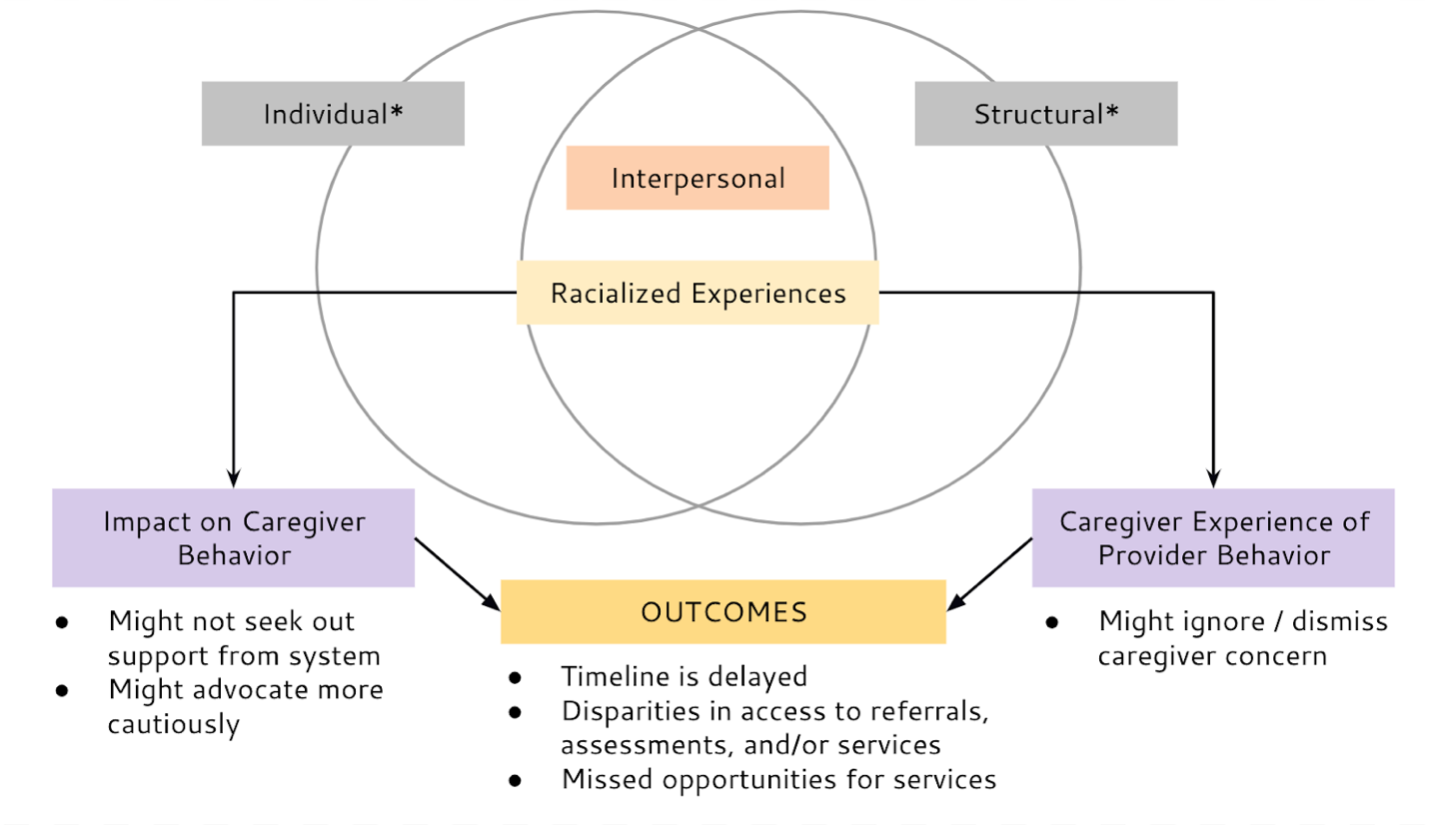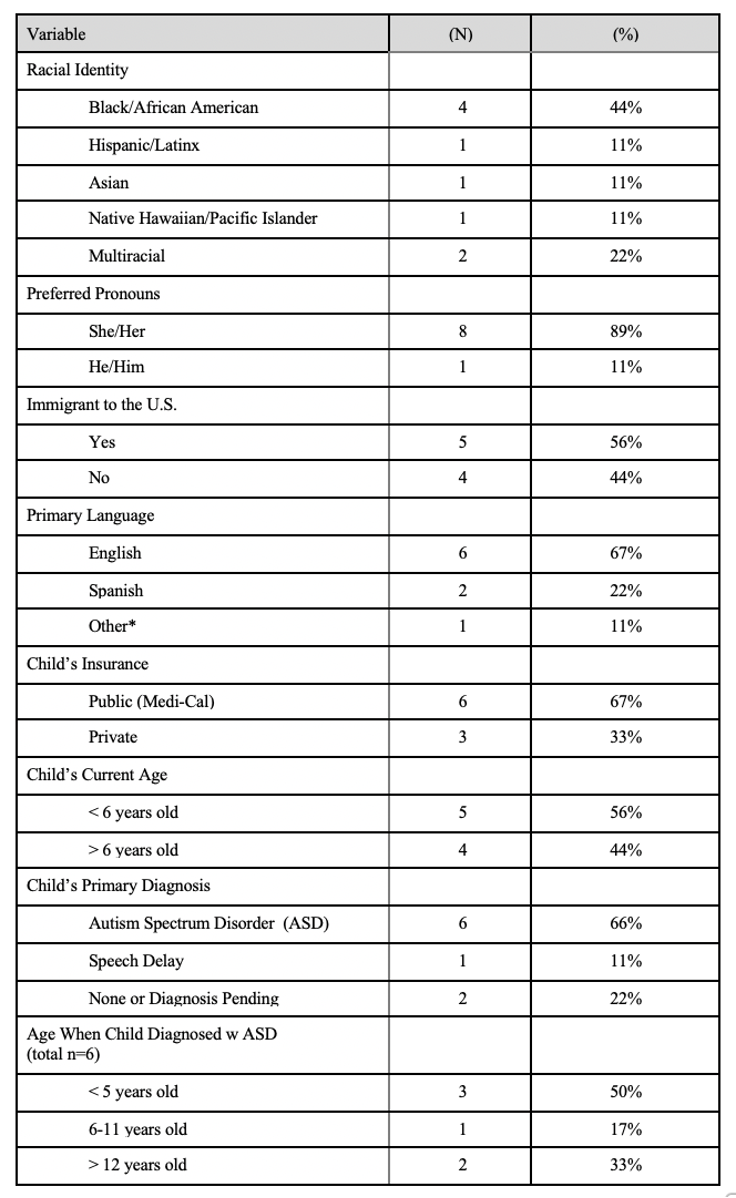Back
Background: Early intervention (EI) services – including but not limited to speech, physical, occupational, and mental health therapies – have been shown to benefit young children’s development, shaping their readiness for school and offering pivotal support for caregivers. However, racial disparities persist in identification for and access to EI services. Studies that have been conducted to explain such disparities tend to focus on race as a risk factor, and highlight differences in help-seeking between minoritized and white groups. Little is known about the ways in which racism affects how caregivers experience and navigate the screening and EI referral process.
Objective: We used a qualitative approach to understand and elevate the experiences of minoritized caregivers of children who participated in EI, employing a Critical Race Theory (CRT) lens to assess how caregivers are racialized in the process.
Design/Methods: Through in-depth virtual interviews, we explored the experiences of caregivers who self-identified as minoritized and resided in the San Francisco Bay Area. Each caregiver was interviewed twice, first answering the developed qualitative prompts and then later listening to a summary of that interview, allowing the caregiver to correct, validate, or contradict the summary. This inclusive approach enabled participants to interact with their own data and have more agency in the process of knowledge production. Interviews were transcribed and coded by three researchers, who co-developed a codebook through conversation and consensus building.
Results: Nine caregivers were recruited, composing a racially and socioeconomically diverse sample. Thematic qualitative analysis revealed five themes, in which caregivers 1) experienced provider dismissal of their concerns, 2) perceived that providers made assumptions about them, 3) felt that providers had different developmental expectations for their children, 4) were made to feel like a burden on the system, and 5) had to manage stereotype threat, or adjust their behavior so as to not fulfill racial stereotypes. Some caregivers did not want to seek support from EI pathways because of racialized interactions.
Conclusion(s): Our study illuminates how minoritized groups might experience disparities in EI outcomes not because of their race, but because of racism within the system (see figure 1). Efforts to address mechanisms of interpersonal racism in EI pathways are greatly needed, and specific recommendations are offered. Mechanisms of structural racism must also be addressed, but are outside of the present scope.


Developmental and Behavioral Pediatrics: Other
Developmental and Behavioral Pediatrics 7
607 - Caregiver Experiences Of Racialization While Accessing Early Intervention (EI) Services For Their Children
Monday, May 1, 2023
9:30 AM – 11:30 AM ET
Poster Number: 607
Publication Number: 607.402
Publication Number: 607.402
Jessa Culver, UC Berkeley - UCSF Joint Medical Program, Berkeley, CA, United States; Susanne P.. Martin-Herz, University of California, San Francisco, School of Medicine, San Francisco, CA, United States; Adriana Guzman, University of California, Berkeley, Sylmar, CA, United States; Javier Aguayo, University of California, Davis, School of Medicine, Sacramento, CA, United States; Jyothi Marbin, University of California, San Francisco, School of Medicine, alameda, CA, United States; Kenya L. Martinez, n/a, SACRAMENTO, CA, United States; Jennifer James, University of California, San Francisco, San Francisco, CA, United States

Jessa Culver, MS (she/her/hers)
Medical Student
UC Berkeley - UCSF Joint Medical Program
Berkeley, California, United States
Presenting Author(s)
Background: Early intervention (EI) services – including but not limited to speech, physical, occupational, and mental health therapies – have been shown to benefit young children’s development, shaping their readiness for school and offering pivotal support for caregivers. However, racial disparities persist in identification for and access to EI services. Studies that have been conducted to explain such disparities tend to focus on race as a risk factor, and highlight differences in help-seeking between minoritized and white groups. Little is known about the ways in which racism affects how caregivers experience and navigate the screening and EI referral process.
Objective: We used a qualitative approach to understand and elevate the experiences of minoritized caregivers of children who participated in EI, employing a Critical Race Theory (CRT) lens to assess how caregivers are racialized in the process.
Design/Methods: Through in-depth virtual interviews, we explored the experiences of caregivers who self-identified as minoritized and resided in the San Francisco Bay Area. Each caregiver was interviewed twice, first answering the developed qualitative prompts and then later listening to a summary of that interview, allowing the caregiver to correct, validate, or contradict the summary. This inclusive approach enabled participants to interact with their own data and have more agency in the process of knowledge production. Interviews were transcribed and coded by three researchers, who co-developed a codebook through conversation and consensus building.
Results: Nine caregivers were recruited, composing a racially and socioeconomically diverse sample. Thematic qualitative analysis revealed five themes, in which caregivers 1) experienced provider dismissal of their concerns, 2) perceived that providers made assumptions about them, 3) felt that providers had different developmental expectations for their children, 4) were made to feel like a burden on the system, and 5) had to manage stereotype threat, or adjust their behavior so as to not fulfill racial stereotypes. Some caregivers did not want to seek support from EI pathways because of racialized interactions.
Conclusion(s): Our study illuminates how minoritized groups might experience disparities in EI outcomes not because of their race, but because of racism within the system (see figure 1). Efforts to address mechanisms of interpersonal racism in EI pathways are greatly needed, and specific recommendations are offered. Mechanisms of structural racism must also be addressed, but are outside of the present scope.


